- Home
- Barbara Pym
No Fond Return of Love
No Fond Return of Love Read online
NO FOND RETURN OF LOVE
BARBARA PYM
PERENNIAL LIBRARY
Harper & Row, Publishers New York, Cambridge, Philadelphia, San Francisco London, Mexico City, Sao Paulo, Singapore, Sydney
A hardcover edition of this book was first published in Great Britain in 1961 by Jonathan Cape Ltd. and in the United States in 1982 by E. E Dutton, Inc. It is here reprinted by arrangement with E. P Dutton, Inc.
no fond return of love. Copyright Š 1961 by Barbara Pym. All rights reserved. Printed in the United States of America. No part of this book may be used or reproduced in any manner whatsoever without written permission except in the case of brief quotations embodied in critical articles and reviews. For information address E. P Dutton, Inc., Two Park Avenue, New York, N.Y. 10016.
First perennial library edition published 1984. Reissued in 1986.
Library of Congress Cataloging in Publication Data
Pym, Barbara.
No fond return of love.
“Perennial Library.”
Reprint. Originally published : Dutton, cl961. I. Title.
[PR6066.Y58N6 1986] 823’.914 83-48377 ISBN 0-06-097043-X (pbk.)
86 87 88 89 90 MPC 10 987654321
To
Hazel Holt
Chapter One
THERE ARE various ways of mending a broken heart, but perhaps going to a learned conference is one of the more unusual.
When Dulcie Mainwaring realized that her fiance did not want to marry her after all — or that he was not worthy of her love, as he put it — she endured several months of quiet misery before she felt able to rouse herself from this state. When the notice of the conference came, it seemed to be just the kind of thing that was recommended for women in her position — an opportunity to meet new people and to amuse herself by observing the lives of others, even if only for a week-end and under somewhat unusual circumstances.
For what could be more peculiar than a crowd of grown-up people, most of them middle-aged or even elderly, collected together in a girls’ boarding school in Derbyshire for the purpose of discussing scholarly niceties that meant nothing to most of the world? Even the rooms — fortunately they were not to be crowded into dormitories — seemed unnatural, with their twin iron bedsteads and the prospect of strange companions at such close quarters.
Dulcie began to speculate on who hers would be, and looked forward to her entry — for surely the room-mate would be female? — with some apprehension. But at least it would be interesting, she told herself bravely, to share a room with a stranger, and when she heard footsteps coming along the corridor, she braced herself and wondered what they would say to each other when the door opened. But the footsteps went past and stopped a little further on. Then, looking again at the second bed, she noticed that it seemed suspiciously flat, and when she lifted the cover she saw that it was not made up. She was at once relieved and disappointed. When she had plucked up enough courage, she would go and see who was in the room next door.
It had been a mistake to come. Viola Dace realized that now, as she looked round the little cell-like room in dismay which approached panic when she saw that there was a second bed, covered like her own with a white honeycomb quilt. So she might have to share this miserable room with an unknown person — the idea was insupportable! Cautiously she lifted a corner of the quilt to see if the bed was made up; to her relief it was not, for underneath were only a pillow in a striped ticking cover and a pile of grey blankets. At least, then, she was to have the room to herself, and it might just be possible to endure it for three nights.
She lit a cigarette and leaned out of the window. There was a fine display of dahlias in a border below her, apples and pears hung heavily on the trees, and in the distance moors stretched away to hills and what was apparently the world outside and freedom.
There was a light tap on the door and Viola turned round, startled, saying ‘Come in’ rather sharply. She saw a rather tall woman in her early thirties, with a pleasant face and fair hair, standing on the threshold. She wore a tweed suit and brogued shoes which looked too heavy for her thin legs.
Already halfway to being a dim English spinster, Viola thought, conscious of herself’making a contrast’ in her black dress, with her pale, rather haggard face and untidy dark hair.
‘I’m Dulcie Mainwaring,’ said the fair-haired woman. ‘My room seems to be next to yours. I wondered if we might go down to dinner together?’
‘If you like,’ said Viola rather ungraciously. ‘My name’s Viola Dace, by the way. What does one do and wear?’
‘I suppose nobody really knows,’ said Dulcie. ‘It might be like the first night on board ship when nobody changes for dinner. I believe it’s the first time a conference of this sort has been held here. I know they have “religious bodies”, and writers, too, I believe. I suppose we’re writers, in a way.’
‘Yes, we might call ourselves that.’ Viola had taken out her lipstick and was applying it almost savagely, as if she were determined to make herself look as unlike somebody who worked on the dustier fringes of the academic world as possible.
Dulcie gazed fascinated at the result, but the brilliant coral-coloured mouth in the sallow face certainly looked bizarre and striking, and made her slightly dissatisfied with her own careful ‘natural’ make-up.
‘It’s an unusual idea having a conference of people like us,’ said Dulcie. ‘Do we all correct proofs, make bibliographies and indexes, and do all the rather humdrum thankless tasks for people more brilliant than ourselves?’
She seemed to dwell on the words almost with relish, Viola thought, as if she were determined to create an impression of the utmost dreariness.
‘Oh, my life isn’t at all like that,’ she said quickly. ‘I’ve been doing research of my own and I’ve already started a novel. I’ve really come here because I know one of the lecturers and…’
She hesitated, the feeling of dismay rising up in her again, for surely it had been a mistake to come. This worthy Miss Mainwaring, whom one could just imagine doing all the dreary things she had described, was not, however, the kind of person in whom she would dream of confiding.
‘I just do odd jobs and make indexes,’ said Dulcie cheerfully. ‘I found it better to work at home when my mother was ill, and I haven’t really thought of taking a full-time job since she died.’
A bell began to toll, which seemed to Viola to add to the gloomy feeling Dulcie had given her.
‘That must be dinner,’ she said. ‘Shall we go down?’ It would surely be possible to shake her off some time during the evening.
Aylwin Forbes lifted a flat half-bottle of gin out of his suitcase from among the folds of his pyjamas, where it had travelled safely from London to this remote Derbyshire village. He placed it first of all on the dressing-table, but it did not look right with his yeast tablets and stomach powder and hair tonic, so, as there was no other cupboard, it had to go in the wardrobe after all — that traditional, if rather shameful, hiding place for bottles.
The other important item in his luggage — the notes for the lecture he was to give on ‘Some problems of an editor’ — he placed on the chair by his bed.
Then he noticed that there was, in fact, a small cupboard above the washbasin, presumably intended for medicines, so he took the bottle of gin out of the wardrobe and put it in the cupboard. A thought occurred to him, and he wondered if the servants were honest, imagining one of them lifting the gin bottle to her lips and taking a quick swig as she did his room in the morning. Well, he would have to risk that, he decided, and put the gin with the yeast tablets and the stomach powder in the little cupboard; but he could not decide where he was likely to be when he was using the hair lotion, so he left that on the dress
ing-table. He next took up the lecture notes from the chair by the bed and placed them on the dressing-table by his brushes and Florentine leather stud box.
All that now remained in his suitcase were the latest number of the literary journal of which he was editor and the large photograph frame — also of Florentine leather — containing the photograph of his wife, Marjorie. He took out the journal and laid it on the chair by the bed, with a slight feeling of distaste, as if picturing himself lying in bed reading it, but there was no convenient place for Marjorie so he put the frame back into the suitcase, shut it and pushed it under the bed. After all, there was really no point in having it out now.
He opened the door cautiously and looked down the long corridor, wondering where the lavatory might be. He had even taken a few hesitant steps in one direction, when he saw an elderly woman in pince-nez, hair-net, and quilted dressing-gown patterned with large red flowers, carrying a towel and sponge bag, walking purposefully towards him. Wherever he had been making for, she would surely get there first. He withdrew rapidly into the shelter of his room, deeply disturbed. Was there not even to be segregation of the sexes?
The woman’s footsteps went padding past and seemed to stop at the room next to his. And then he realized that it was Miss Faith Randall, a fellow lecturer. In his mind’s eye he saw the title of the lecture she was to give — ‘Some problems of indexing’. Was every lecture to be on ‘Some problems of something’? he wondered, going out into the corridor more boldly this time.
When he got back to his room he poured some gin into a tooth-glass, added water from the tap, and drank it off rather quickly, as if it were medicine — which, in a sense, it was. I must go down to dinner, he thought, comforted by the remembrance that the lecturers sat at a table apart from the other members of the conference. He remembered Miss Randall with her hair-net and pince-nez, and wondered if he would find himself sitting next to her and what they could talk about. Indexes I have known? Abortion, adultery, administration … pottery, prawns, pregnancy — good-oh! Perhaps he had drunk the gin a little too quickly.
‘Who is that good-looking man?’ Dulcie whispered to Viola, as they stood in the ante-room waiting for the final gong to sound for dinner.
‘Good-looking man — where?’ Viola had been lost in contemplation of their fellow conference members, who were not, on the whole, good-looking. Indeed, she had been wondering what conference could possibly consist of good-looking people, unless it were one of actors or film stars. But as soon as Dulcie spoke she knew who it must be, and was annoyed and almost disappointed that she should not have felt his presence in some mysterious way.
She looked up and saw the blond leonine head, the well-shaped nose, and the dark eyes, so unusual with fair hair.
‘That’s Aylwin Forbes,’ she said.
‘Ah, yes. “Some problems of an editor”,’ Dulcie quoted. ‘He looks as if he might have other problems too — being so handsome, I mean. What is he editor of? — I’ve forgotten for the moment. Does he really know about our problems?’
Viola named the journal which Aylwin Forbes edited. ‘I happen to know him rather well,’ she added.
‘Oh?’
‘He and I were once …’ Viola hesitated, teasing out the fringe of her black and silver stole.
‘I see,’ Dulcie said, but of course she did not see. What was it they were once, or had been once to each other? Lovers? Colleagues? Editor and assistant editor? Or had he merely seized her in his arms in some dusty library in a convenient corner by the card index catalogues one afternoon in spring? Impossible to tell, from Viola’s guarded hint. How irritating it sometimes was, the delicacy of women!
‘Is he married?’ asked Dulcie stoutly.
‘Oh, of course — in a sense, that is,’ said Viola impatiently.
Dulcie nodded. People usually were married, and how often it was ‘in a sense’.
Aylwin Forbes now came over to where they were standing.
‘Why, hullo, Vi! I wondered if you might be here,’ he said in a jolly tone, which seemed as if it might have been assumed specially for the conference.
‘Hullo, Aylwin,’ said Viola, inhibited by Dulcie’s presence and annoyed that he had called her ‘Vi’. She did not like to be reminded that she had been christened Violet, from some confused Wordsworthian fancy of her father’s — ‘a violet by a mossy stone, half hidden from the eye’ — such a charming idea, he had thought, not realizing that the name Violet did not really suggest this. When she was seventeen she had called herself Viola.
‘I see you are to lecture to us,’ Viola went on. ‘No doubt we shall be meeting later on.’
‘Yes, we must have a good gossip together,’ said Aylwin, but at that moment a gong boomed, and the crowd moved forward into the dining-room, an old man with a white beard leading the way.
The dining-room was large and capable of seating many more than were assembled at the two long tables. There was a smaller table set aside for the organizers and lecturers and Aylwin moved over to it quickly, relieved to have an excuse to leave the two women. He made a rather feeble joke about sheep and goats, feeling that he could hardly have done less, and took his place between two harmless-looking middle-aged men, one of whom he recognized as a fellow expert who was to lecture on the terrors and triumphs of setting out a bibliography correctly.
Dulcie and Viola, meanwhile, found themselves at the end of one of the long tables at which a tall comfortable-looking woman was beginning to ladle out soup from a large tureen. She seemed to be enjoying herself, plunging the ladle into the steaming savoury-smelling broth as if she were a medieval nun or friar feeding the assembled poor.
‘It seems that whoever’s at this end has to cope with the grub,’ she said in a loud, jolly voice. ‘Would you mind shoving the plates along?’
Dulcie and Viola did as they were told and the meal began. After the soup a plate of sliced meat and some dishes of vegetables were brought, which they helped to serve.
‘What do you do exactly?’ said Dulcie to Viola rather bluntly. ‘Do you make indexes or sub-edit a journal or what?’
Viola hesitated, then said, ‘I’ve done some research of my own. I was working for a Ph.D. at London University but my health broke down. As a matter of fact’ she added casually, ‘I once did some work for Aylwin Forbes.’
‘That must have been fun.’
‘Well, it was a stimulating experience, of course,’ she said, a little reproachfully. ‘He’s very brilliant, you know.’
‘Yes, and so good-looking,’ said the woman who had served out the soup. ‘I always think that helps.’
Dulcie looked at her curiously. The participants in the conference had been asked to wear their names and she now noticed beside a large finely carved cameo brooch of Leda and the Swan a small circle of cardboard, bearing the name jessica foy in block capitals. She recognized it as that of the librarian of quite a well-known learned institution and instinctively drew back a little, unable to reconcile such eminence with this jolly woman serving out the soup.
‘Research, with a good-looking man,’ Miss Foy went on. ‘That’s an enviable lot. What was the subject of your research?’
‘Oh, just an obscure eighteenth-century poet,’ said Viola quickly.
‘You were lucky to find one so obscure that not even the Americans had “done” him,’ commented Miss Foy dryly. ‘It’s quite serious, this shortage of obscure poets.’
‘Perhaps the time will come when one may be permitted to do research into the lives of ordinary people,’ said Dulcie, ‘people who have no claim to fame whatsoever.’
‘Ah, that’ll be the day!’ said Miss Foy jovially.
‘I love finding out about people,’ said Dulcie. ‘I suppose it’s a sort of compensation for the dreariness of everyday life.’
Viola stared at her, astonished that any woman could admit to such a weakness as the need for compensation.
‘You might get married,’ she said doubtfully, remembering the heavy shoes
on the thin legs.
‘Yes,’ Dulcie agreed, ‘I might, but even if I did marry I don’t suppose my character would alter much.’
‘You would not allow yourself to be moulded by any man,’ said Miss Foy in a satisfied tone, ‘and neither should I.’
Dulcie turned away to hide a smile.
Viola looked a little annoyed, as if, Dulcie thought, she wouldn’t have minded being moulded. But of course the question didn’t always arise. Sometimes it was the other way round. Maurice,
Dulcie’s ex-fiancé, would be quite incapable of moulding anybody, for he was rather a weak character — could she really admit that now? — and also three years younger than herself.
‘Perhaps other people’s lives are a kind of refuge,’ she suggested. ‘One can enjoy the cosiness of them.’
‘But they aren’t always cosy,’ said Miss Foy.
‘No, and then one finds oneself looking at the horror or misery in them with detachment, and that in itself is horrifying.’
Miss Foy laughed uncertainly. ‘I wonder if you’ll find a subject here.’
‘Probably not. It seems too obvious a hunting-ground, if you see what I mean.’
‘Yes — too many eccentrics,’ said Miss Foy, realizing that her own greatest pleasure in life was a tricky item of classification or biblio-graphical entry. ‘Look, here’s the pud. Shall I serve it or would you like to?’
‘Oh, you do it,’ said Dulcie. ‘I’m not very good at measuring things out.’ She felt that the performance of this simple task might be satisfying a deeply felt need in Miss Foy, which was something more than mere bossiness.
At the end of the meal the tables were cleared; it seemed that nobody could leave without carrying something, even if it was only a jug of custard or an unused fork They then moved over to the conference hall to hear about the programme for the week-end. It was announced that on this, the first, evening there would be no lecture or discussion, but a kind of’social gathering’ so that members could get to know each other better. Coffee would be served.

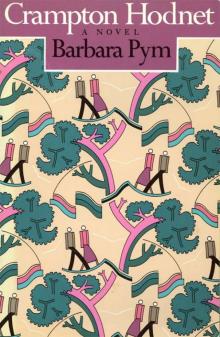 Crampton Hodnet
Crampton Hodnet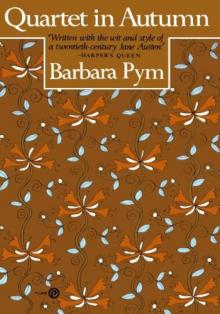 Quartet in Autumn
Quartet in Autumn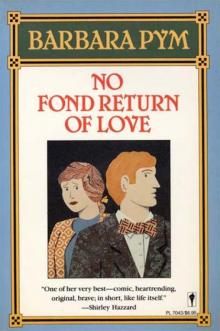 No Fond Return of Love
No Fond Return of Love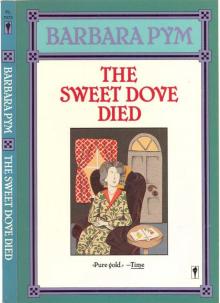 The Sweet Dove Died
The Sweet Dove Died Excellent Women
Excellent Women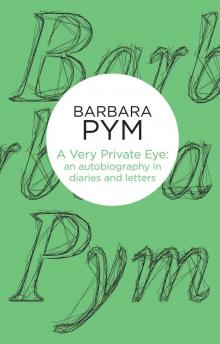 A Very Private Eye: The Diaries, Letters and Notebooks of Barbara Pym
A Very Private Eye: The Diaries, Letters and Notebooks of Barbara Pym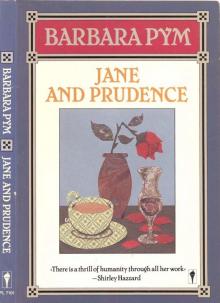 Jane and Prudence
Jane and Prudence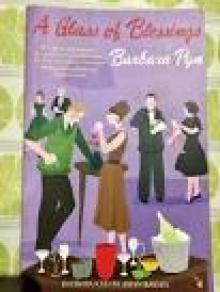 A Glass of Blessings
A Glass of Blessings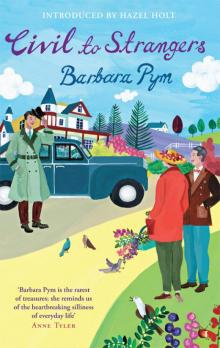 Civil to Strangers and Other Writings
Civil to Strangers and Other Writings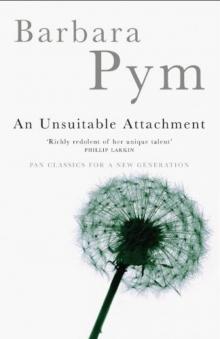 An Unsuitable Attachment
An Unsuitable Attachment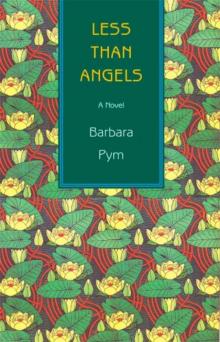 Less Than Angels
Less Than Angels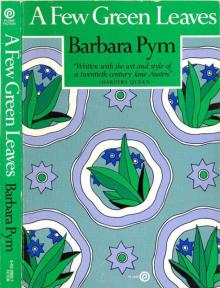 A Few Green Leaves
A Few Green Leaves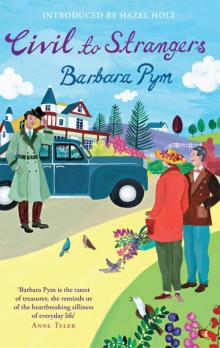 Civil to Strangers
Civil to Strangers